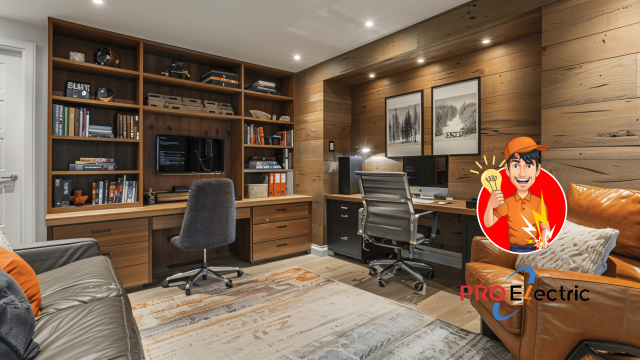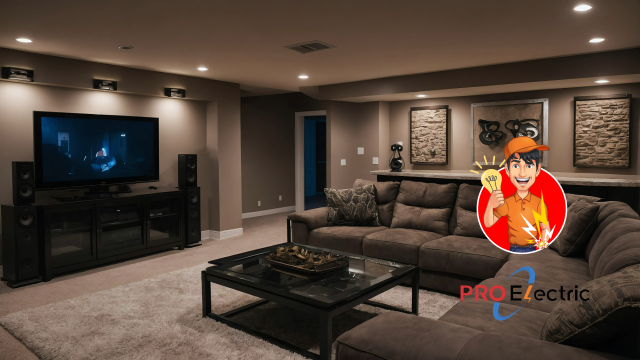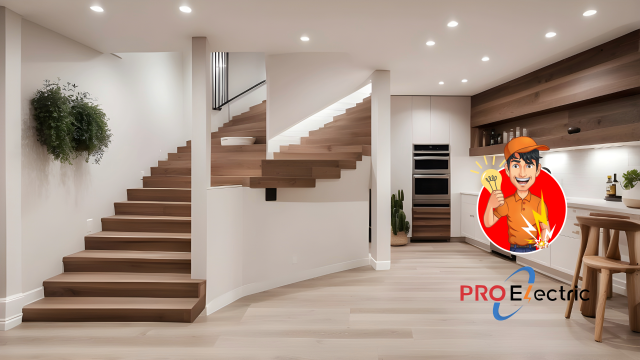A basement renovation in Loudoun County today is not simply a creative process of redefining interior spaces; it is a legislative dance of permissibility, safety, and value.
Picture a basement that took thousands to retrofit perfectly – but then became a madhouse of prohibitive legal judgments, fines, and potentially very unsafe mistakes, all from skipping the permit process.
And it’s not simply a homeowner’s horror show; it forces homeowners—individuals—to confront the fact that the Big Rock Candyfips Way—the unique intersection of personal vision and civic responsibility—must be danced with more steps, more bouts of ballet-like precision, and more obeisance to local rules.
Turn the pages as we wander through the basement makeover, looking at how projects like this can remake your home.
Why should you give it a go? You do it all by the rules—specifically, by the regulations of Loudoun County, so your fantastic space doesn’t become a regulatory nightmare.
Five Reasons for a Finished Basement in Loudoun County
A home needs more living space. Living in a basement is one of the most common options.
Homeowners sometimes like renovating basements to create more living space for their families. This is because their families become larger for children’s rooms, or they want their guests to have a wine cellar as visitors.
Designing a Home Office or Study Area: With the growing trend of remote working and online education, many people are trying to convert their basements into dedicated offices or study areas.

This provides a quiet room, separating people from the house’s main activities and thus allowing for concentration and productivity.
Creating a Home Entertainment Center: This part of the house is uniquely well-adapted for creating a home entertainment center: a home theatre, game room, or space generally devoted to recreation.

It makes a space for recreation away from the more formal parts of the home.
Rental Income: Making a rental income is another crucial aspect that may induce people to remodel their basements. Some homeowners decide to build an independent apartment in their basement.

It can be rented to a third party, and in addition to being a useful means of using unused space, it guarantees continuous supplementary income.
Spaces for Special Activities: Since basements are often disconnected from the rest of the house, they can provide spaces for particular activities.

People can use them to build home gyms, workshops, craft rooms, or for home brewing.
The Dangers of Not Obtaining the Proper Permits
One of the most important measures for renovating and externally constructing a home is getting the required permit.
Otherwise, the work could be dangerous and cause unwanted issues.
Allow me to describe significant problems that could come along by ignoring permits:
- Safety: Permitting ensures buildings are constructed to code designed for safety. Without a permit, there is no guarantee that the work is safe, there could be dangerous ‘conditions’ (walls not quite supporting a building, live wiring unprotected, probability a gas leak).
- Legal Problems: In many places, carrying out the work would not be illegal, so long as you have a permit or something similar. If discovered, you might face penalties, a civil or criminal action, or an order that the work needs to be reversed – at significant cost and delay.
- Insurance Troubles: Insurance companies could demand proof that your remodeling was done to code and permitted. If damage ensues due to illegal work, your insurance might not cover you, forcing you to cover the costs of repairs or liability yourself.
- Problems with Resale: If you must reveal renovations to any prospective purchaser – which you will most likely have to do with copies of any issued permits – you might well be able to sell the property, maybe at a reduced amount, with instructions that work needs to be brought up to current code, at your expense, before it is sold, or you may not be able to sell it at all.
- Difficulty in Financing and Refinancing: Many banks and other lenders will require proof that renovations meet building code requirements. If you don’t have the proper permits, they may not be willing or able to finance your home or allow you to refinance.
- Costly Retroactive Permits and Corrections: If and when you do get caught without the permits required for your renovation, you will likely be required to obtain those permits retroactively, which means you’ll have to tear out some of your renovated walls so inspectors can review your work, make costly and time-consuming corrections, and either pay fines or penalties for not having obtained the required permits upfront.
- Reduced Work Quality: Most permits require several inspections throughout a project. These inspections are needed as part of professional oversight to ensure that the quality and accuracy of the work are within acceptable parameters.
- Neighborhood: Unpermitted work may adversely affect your neighbors. For example, you may divert the water flow off your lot so that it flows into your neighbor’s yard. This can result in a quarrel with your neighbors or even litigation.
- Risk to Future Owners: If you sell your home and the unpermitted work comes back to haunt the next owners by exposing them to problems or hazards, they could sue you for not disclosing or properly documenting their home’s history.
In short, obtaining permits may mean an additional effort or expense.
Still, they are among the best safety nets for ensuring the safety, legality, and financial stability of any building project.
Therefore, it is advisable to first contact the local building authorities about the paperwork required to commence or continue work on your property.
Examples of What Could Happen if You Didn’t Get a Permit
If a homeowner in Loudoun County spent many thousands of dollars finishing a basement but did not get building permits, and the county was then to learn of this, some serious consequences might occur. Below are three examples of what could result.
Mandatory Cease of Work and Fines
The county could immediately issue a stop work order and halt construction, even if the basement renovation is nearly complete. The homeowner can proceed only by resolving the permit problem and may accrue penalties or fines as part of the process.
Required Retroactive Permitting and Possible Renovation Reversal
The homeowner must apply (retroactively) for the permits, which is usually more complicated and costly than prior to initiating the work. This could include:
Paying higher fees for the retroactive permits.
Providing detailed plans and drawings of the finished basement to the county for approval.
To inspect portions of the completed work, the drywall or other finish would be removed to see the electrical, plumbing, and structural work.
If the existing work needs to be brought up to code (for example, for the county), the homeowner may have to undo portions of the renovation entirely, increasing the cost.
Complications in Selling the Property
Since homeowners are legally obliged to disclose the existence of renovations (and whether they were permitted), a basement finished without the appropriate permitting will almost certainly sidetrack potential buyers, making it difficult to sell the property. At the very least, the home will sell for less than initially anticipated; in the worst-case scenario, prospective buyers could dismiss the home altogether or demand a lower sale price, with the expressed desire to have the work brought up to code – or even to return the basement to its initial state – before committing to the sale.
Such examples demonstrate the importance of getting permits for home renovations in the County of Loudoun: the vast expense, legality, and other complexity involved in not heeding the rules and local building code.
The Benefits of Getting the Proper Permits for Loudoun County Homeowners
Permit for a house construction project in Loudoun County has several benefits to please any homeowner who requires renovations done on their property. Here are some of them:
- Ensuring Safety: Permits produce inspections, ensuring safe practices for all the work performed on your property. This includes electrical, structural, and plumbing work, among others, any of which, performed incorrectly, can prove fatal.
- Increase value—Legal works completed correctly by a qualified official can increase the value of your home. Potential buyers prefer to buy homes with licensed work carried out as it assures them that the work was carried out legally and correctly.
- Legal Compliance: Any renovations to your home must comply with local building codes and regulations. Because of this, the City requires permits, ensuring that your remodeling or renovating work is done legally. This will help you avoid a huge headache of legal problems, fines, and non-compliance stress.
- Permit the Pathway to Filing an Insurance Claim: The permit might come in handy when you file a claim for any problem with work done in that area of the home. Mortgage companies and insurers often require homeowners to provide proof that work was completed to code and legally.
- Avoid future problems: When you sell your home, you must disclose what renovations and improvements you made. Having the permits in order will make the sale much quicker and help avoid delays or renegotiations.
- Access to professional expertise: Permits are often administered by professionals who not only process the permit but can also provide useful advice and help you carry out your project correctly and efficiently.
- Preserving the Neighbourhood: Permitted work will maintain or establish specific standards in the neighborhood, which are essential for its beauty and safety.
- Avoiding Costly Redo: If the work was done without permits, you could be required to redo the project with all the required licenses in place. That would involve significant additional expenses. Permits can save you that expense.
- Peace of mind: Knowing that your project meets local codes and safety requirements can help you feel secure about proceeding with it or completing it.
The permits required for home renovations in Loudoun County have benefits beyond meeting legal obligations—safety, prudent financial planning, and the condition of your home are all beneficiaries.
Loudoun County’s Permit Process
If you have a Loudoun County home and want to add a finished basement, the process involves various steps, including acquiring the necessary permits. Here is a step-by-step guide which will help you achieve this:
Step 1: Planning Your Basement Renovation
- Assess Your Needs: Clarifying your needs for your finished basement will help you budget your time and money. What kind of space are you looking for—an extra living space or a home office?
- Hire an Expert: Consider employing a local architect, contractor, and electrician to draft and review your plans to ensure they comply with your local building codes.
Step 2: Understanding Required Permits
In Loudoun County, several permits may be required depending on your project’s scope:
Building and Zoning Permit: For architectural and structural work, signed by the property owner.
Trade Permits: These include electrical, gas, mechanical, and plumbing permits for respective installations.
Step 3: Additional Documentation
Basement Drawings: Drawings showing the proposed basement layout, electrical plans, and any structural changes.
Typical Finished Basement Details: Loudoun County’s Typical Finished Basement Details may replace drawings in some projects.
Step 4: How to Apply for Permits (Loudoun County Government Center)
Online Application: You can apply online through LandMARC (an account is required).
In-Person Application: You can also mail your application and supporting documents to the Building and Development office at the Loudoun County Government Center, 1 Harrison Street, SE, Leesburg, Virginia 20175.
For walk-in service, they are open Monday through Friday, 8:30 a.m. to 5 p.m.
Step 5: Submitting Your Application
- Gather Your Documents: Bring your permit application, drawings of the basement (or the Typical Basement Detail Packet), or anything else you might need.
- Review and Submit: Double-check your application and documents for completeness and accuracy before submission.
Step 6: Review and Approval
- Please wait for Approval: After you submit your application to the county, someone will review it. This process may take some time, so remember to be patient. If you have an issue or need further information, be ready to reply.
- Handle and Oversee Correspondence: Check that your email account doesn’t contain a dreaded yellow caution icon, and respond appropriately.
Step 7: Commence Construction
- Get To Work: You can commence construction when you get the all-clear for your approved permits. Follow your approved plan and local building code rules.
- Inspections: Expect periodic inspections by county officials to ensure compliance with building standards.
Step 8: Completion
Third-party inspection: After your basement is completed, a final inspection may be required to close all permits.
Enjoy your new living space: your basement is complete!
Just note that every renovation is a one-off; requirements will change, and codes will vary, so always research and check in with your local authority or building professional to ensure you’re up to code for your individual project.
Finally, the story of turning a basement in Loudoun County into a home that can accommodate work and life shows how the powers of enterprise and the operations of law can work together.
Although it is a complicated path, it is the only safe, legal, and sane way to navigate the complexity of permissions and regulations.
This is not only a way to keep your house upright at the structural level and ethical at the personal level but also a way to contribute to the common texture of the community at both levels.
When homeowners check their aspirations to remake their living spaces against the community’s mindful engagement with local bylaws, we don’t just tame a built order.
We extend patterns of care and conformity—our homes and neighborhoods improve.
Thus, this renovation, regulation, and realization dance adds to the melodies of self-actualization and mutual admiration à la Loudoun County’s innovation and safety.


